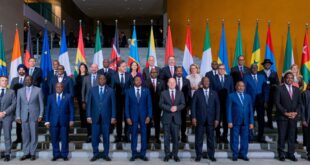In view of the negative impact of the Covid-19 pandemic on international trade, a group representing German companies doing business with Africa has warned that the Corona crisis could reverse the continent’s economic successes of the past decade if counter measures are not taken. It’s calling on the German government to take concrete steps to stabilise German-African economic relations in the short term.
International trade with the African continent has slumped dramatically since the outbreak of the global health crisis. In the first half of the year alone, the German economy recorded a 26 per cent drop in exports to Africa.
The Afrika-Verein der deutschen Wirtschaft e.V., a foreign trade association of German companies and institutions active in economic cooperation with African countries, has now presented an eight-point plan to strengthen trading ties with the continent and reverse the pandemic-induced setbacks.
The association, to which a majority of German companies operating in Africa belong, demands from the German government short-term liquidity support and new financing opportunities for African companies that would otherwise not be able to implement projects dependent on German suppliers. “This will boost our weakened export economy and create local jobs,” the Chairman of Afrika-Verein, Stefan Liebing, said while presenting the plan at its annual general meeting on Thursday (18 November).
“The current crisis has caused the loss of millions of jobs in Africa. We can be sure that this will lead to increased migration pressure and that the stability of some countries will also be endangered in the process,” he pointed out.
“If the German companies and the Federal Government do not take quick countermeasures now, we run the risk that the successes of the past decade in the economic development of the continent will be lost in just a few weeks,” Liebing warned.
In addition to other necessary measures for a reactivation of German trade with Africa, business trips to and from the continent should be made easier at short notice, Afrika-Verein said. “We are in the middle of a restructuring of international value chains. It could make sense for companies to diversify sources of supply and shift production locations to Africa as well. This would require stronger bilateral foreign trade diplomacy,” Liebing opined.
“At present, this does not seem to be a priority for the responsible federal ministries. I think that is dangerous. Competition from Asia is faster than we are.”
Afrika-Verein also called on the Federal Government to refrain from a “supply chain law”, an initiative of leading civil society organisations to legislate an obligation of companies to respect human rights and avoid environmental degradation in their activities in foreign countries.
“This does not fit in with the times. Now we have to make it a priority to ensure that German companies continue to invest in Africa. Burdening them with additional bureaucracy and threatening them with heavy penalties if a medium-sized company is unable to fully monitor its upstream supplier will only ensure that even fewer of the urgently needed good jobs are created in Africa,” Liebing warned. It would make more sense to agree on standards at the European level and implement them at national level, he advised.
Afrika-Verein also pointed out that Africa could play an important role in tackling climate change. With the support of the German government, the first industrial plant for green hydrogen on the African continent is currently being planned in Morocco and other locations are being investigated for their suitability for similar plants.
“These are good first steps, which must now be followed by further measures for a hydrogen pact with Africa” Liebing said. “We have been dealing with strategy workshops and potential studies long enough. Now would be the time to implement the first pilot projects in concrete partnerships in Africa, so that Germany can become the international market leader in this important field,” Liebing added.
Sola Jolaoso
Download the complete paper (in German) HERE.
 THE AFRICAN COURIER. Reporting Africa and its Diaspora! The African Courier is an international magazine published in Germany to report on Africa and the Diaspora African experience. The first issue of the bimonthly magazine appeared on the newsstands on 15 February 1998. The African Courier is a communication forum for European-African political, economic and cultural exchanges, and a voice for Africa in Europe.
THE AFRICAN COURIER. Reporting Africa and its Diaspora! The African Courier is an international magazine published in Germany to report on Africa and the Diaspora African experience. The first issue of the bimonthly magazine appeared on the newsstands on 15 February 1998. The African Courier is a communication forum for European-African political, economic and cultural exchanges, and a voice for Africa in Europe.

































